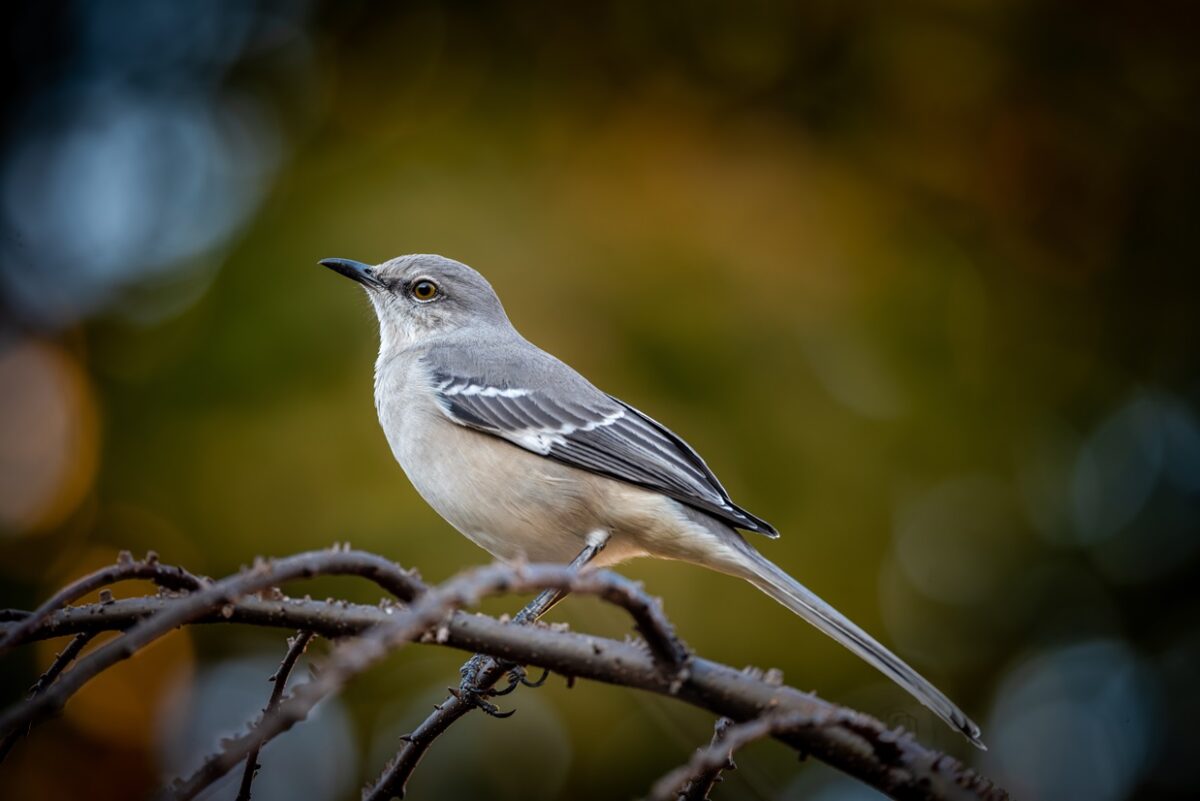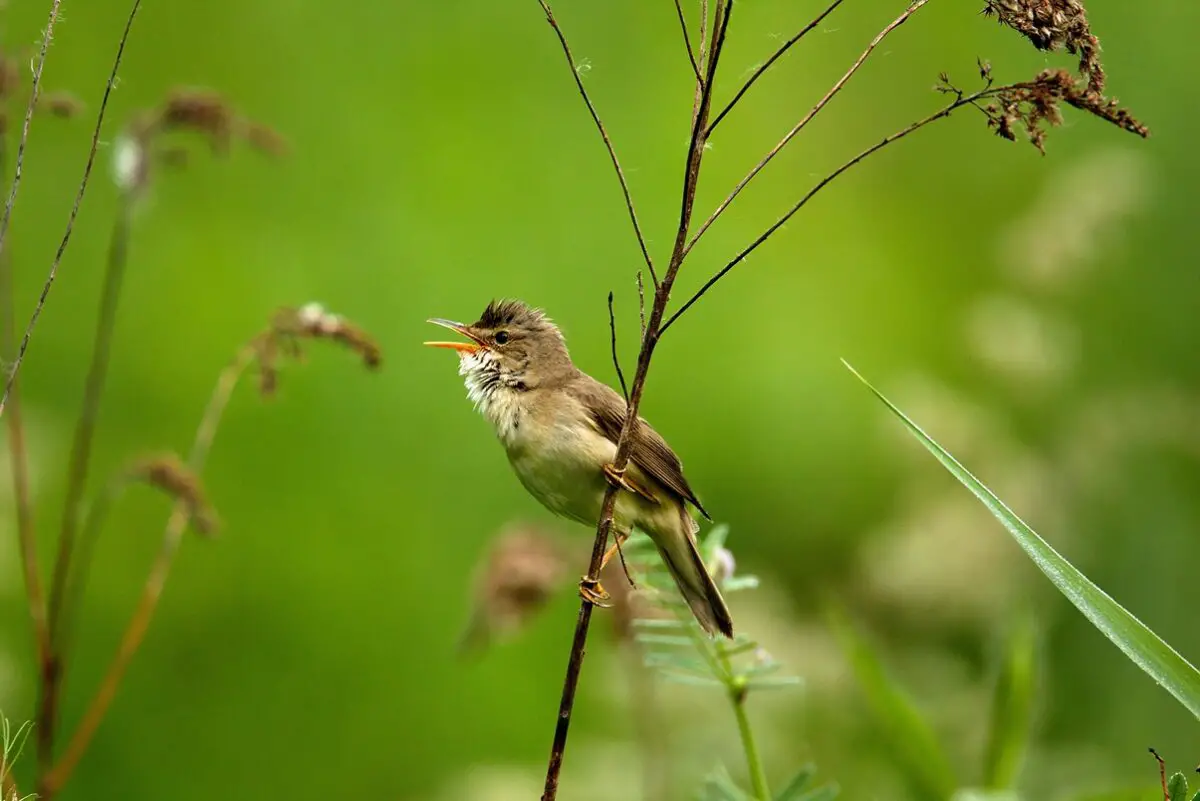When discussing birds that imitate sounds, we first think of parrots, don’t we? But the truth is, they aren’t the only imitators out there! Dozens of other bird species are experts at mimicking various sounds they hear in their habitats, which is quite fascinating! What’s the reason behind this behavior?
Birds imitate sounds to protect themselves against predators, attract mates, deter any threats during the nesting season, and prevent the host species from identifying them as brood parasites. Some species rely on sound mimicking to entertain themselves and communicate!
Are you curious to learn more? Keep reading! We’ve prepared some facts you undoubtedly won’t regret discovering!

Why Do Birds Imitate Sounds?
Birds do not imitate sounds just for the fun of it (at least not all!). Sometimes this behavior is crucial to survive in the wild, as well as protect the young!
1. Sexual Selection
Scientists assume that some male mimicking birds, like northern mockingbirds, learn as many sounds as they can because this helps them find a mate.
It has been argued that females typically choose males that have more sounds in their repertoires! Why so, you’re wondering, right? Well, if a male knows more songs, he must be older, wiser, and great at surviving! Therefore, he’s an excellent choice as a father!
Additionally, it has been proven that male mockingbirds that can produce more sounds have the best territories filled with multiple food sources.
This behavior has also been observed in superb lyrebirds. Females are known to prefer males that produce highly accurate mimicry of diverse sounds.
2. Deterring Predators
Some birds may learn to imitate the sounds produced by other birds to protect their territories and deter predators or rivals.
Female superb lyrebirds, for example, produce lyrebird vocalizations while foraging, which are mixed with the calls of dangerous predators. This occurs during the breeding and nesting season. Therefore, specialists argue that mimicking may be a survival adaptation.
Australian magpies mimic other birds’ sounds for the same reasons – to protect themselves against predators. They learned how to produce barking owl and boobook owl vocalizations. They can even imitate dog and horse sounds!
Some species, like the thick-billed euphonia, may imitate the alarm calls of other species in the vicinity when they feel threatened. This way, it attracts other birds to the nest, which can be of help in protecting it.
3. Brood Parasitism
Brood parasite birds lay their eggs in other birds’ nests, thus relieving themselves of the responsibility of incubating, caring for, and raising the young.
Appropriating this behavior equals learning multiple adaptations, including mimicking the eggs of the host, as well as mimicking the vocalizations of the host. That’s right, some brood parasites are also excellent imitators!
African indigobirds, for example, learn the begging calls of firefinches (since they parasitize firefinch nests) to avoid being recognized as a different species when laying eggs.
4. Social Interaction and Flock Recognition
In the wild, parrots are known to have vocal dialects, just like humans! So, they must learn to mimic these dialects to be able to distinguish the members of their flocks from those of other flocks. Once they learn the dialect, they’ll be less responsive to the calls of other flocks.
In captivity, parrots imitate different sounds as a form of social interaction with humans. Amazon parrots, for example, are highly affectionate birds that enjoy a great deal of interaction and entertainment. They’re highly intelligent birds and seek socialization whenever possible.
The thing is, their owners are part of their flock, so if they hear them repeating a word multiple times, they’ll consider it part of their dialect and will mimic it.
5. Calling For a Mate
Ravens have been observed imitating the sounds of their mates if one pair member is lost. For example, if the female is lost, the male will mimic its sounds (often clapping or clicking) to help the female find her way back.
6. Unknown Reasons
Some birds learned to imitate the songs of other birds for no confirmed scientific reasons. Many scientists tried to establish a particular reason behind a specific bird imitating another species, but they couldn’t find anything – not even one of the reasons mentioned above. They suspect that sometimes they just mislearn what they initially intended to mimic.

What Birds Mimic Other Birds’ Sounds?
If you’re eager to know how far some birds can take this mimicking behavior, you’re in the right place! We’ve listed some of the most talented species when it comes to sound imitation!
- Northern Mockingbirds: They can imitate the songs of northern cardinals, eastern towhees, house sparrows, northern flickers, great crested flycatchers, blue jays, American robins, crickets, dogs, frogs, cats, car alarms, and other songs.
- Lyrebirds: They can mimic the songs of over 20 bird species, including those of green catbirds, whipbirds, and satin bowerbirds. They can also imitate the sounds produced by koalas, dingoes, possums, as well as car engines, car alarms, crying babies, mobile phone ringtones, and human speech.
- Australian magpies: They can mimic over 35 bird species, as well as the sounds produced by dogs and horses; if they live close to humans, they can easily imitate human speech.
- Common ravens: They are experts at mimicking environmental sounds and human speech.
- Marsh warblers: Males are proficient at imitating other birds’ sounds and calls; they’re known to have a repertoire of imitated songs produced by over 75 species.
- Blue jays: They can mimic human speech, as well as the sounds produced by local hawks.
Let’s not forget the famous parrots. If you have one as a pet, you probably never feel lonely, as your parrot entertains conversations all day long!
In the wild, some parrot species, like African gray parrots, are known to imitate the sounds produced by other birds.
Do Talking Birds Know What They Are Saying?
As much as we’d like to provide a clear answer to this question, the truth is that not even scientists know for sure!
It has been speculated that parrots can actually understand what they hear and the words they repeat. Other scientists argue that what seems linguistic understanding is in fact operant conditioning, a learning process that implies that certain behaviors are associated with reinforcement or punishment.
Therefore, the answer to this question is still up for debate. Hopefully, future studies will unfold the mystery!
